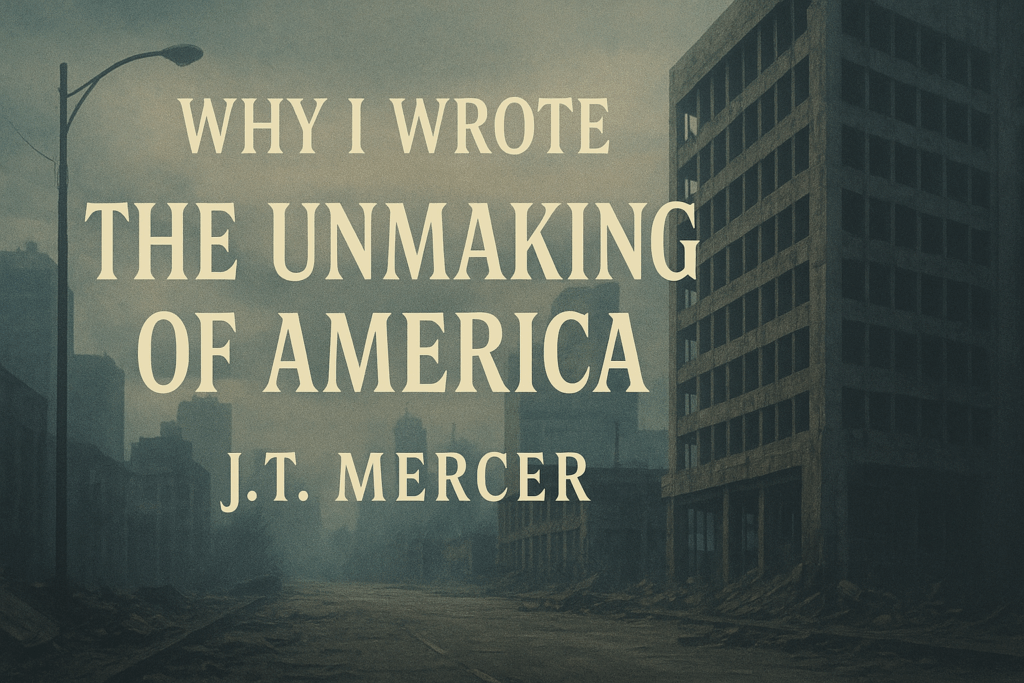Author Notes
Why I Wrote The Unmaking of America
By J.T. Mercer
The Unmaking of America began not as a warning, but as a question that had been building for years:
What happens when a country stops believing in itself, but still pretends everything is fine?
This novel didn’t start as a prediction. It started as a response. I wrote it because I was seeing something I couldn’t ignore—an accelerating shift in how power operates and how the public reacts. The more I looked at the patterns, the more I realized that the institutions we rely on are not as stable as we think. The language of patriotism still echoes in political speeches, but the foundation beneath it is cracking.
A Nation Eroding From Within
For most of my life, I believed in the resilience of American democracy. I believed that the Constitution, the courts, and the press would act as safeguards. They weren’t perfect, but they were supposed to hold the line when things got out of hand. That belief no longer feels justified.
Today, the threats are internal. Laws are increasingly written to restrict access rather than expand it. Agencies are weakened not through violence, but through budget cuts, stalled appointments, and procedural changes buried in legalese. Enforcement becomes selective. Oversight turns partisan. The result is a system that still looks familiar but no longer behaves the way it was designed.
None of this happened overnight. It crept in slowly, through actions that looked procedural or harmless. A single rule change. A delayed nomination. A speech that redefines a common term in a more aggressive way. One by one, those decisions accumulate. Over time, they become a new normal. The Unmaking of America explores how those changes—stacked over years—can reshape a country without the need for tanks or coups.
Divide and Conquer as Strategy
Politics in the U.S. has shifted from governance to spectacle. Outrage is easier to provoke than progress. Slogans replace debate. Neighbors become enemies. Online engagement is driven by conflict, and elected officials learn to use division as a campaign tool.
While people argue over symbols and slogans, power continues to consolidate quietly. Decisions are made in closed rooms. Public comment periods shrink. Oversight mechanisms are either defunded or ignored. Once these changes are implemented, reversing them becomes a much harder task—especially when the public has been conditioned to view every objection as partisan noise.
This isn’t a cultural accident. It’s a governing model. It relies on confusion, distraction, and fatigue. It uses division as fuel. Agencies don’t just malfunction—they are redefined. This pattern is not unique to the United States. Reports from Freedom House and research from the Brennan Center for Justice show how democratic systems are increasingly undermined through legal channels, gerrymandering, and voter suppression—often without triggering a constitutional crisis.
Once these changes are implemented, reversing them becomes a much harder task—especially when the public has been conditioned to view every objection as partisan noise. The Unmaking of America reflects this exact process, showing how power consolidates while the public argues over distractions.
A Story That Mirrors the Headlines
The Unmaking of America is a work of fiction, but it’s grounded in real-world dynamics. The characters face pressure, fear, and misinformation. Some resist. Some rationalize. Others adapt to protect what they still believe is worth saving. There are no secret heroes. No quick resets. The collapse isn’t sudden. It’s a slow march through a series of rationalized decisions.
The book isn’t about despair. It’s about recognition. The fictional narrative is built to feel familiar because many of the events mirror what we see today. If the story feels real, it’s because the conditions already exist.
This isn’t the future I hope for. But I do believe it’s a future we can still avoid—if we’re willing to see what’s happening and respond with more than outrage.
What to Expect from the Series
This novel is the first in a larger series about institutional failure, personal reckoning, and political transformation. It follows people on both sides of a system under pressure—those trying to preserve what remains, and those trying to reshape it in their image. The series asks what happens when the rules no longer apply, but people keep fighting anyway.
If these questions resonate with you, I invite you to join the North River Publications mailing list. Subscribers receive early chapters, behind-the-scenes commentary, and access to material not available anywhere else.
The Unmaking of America is not about accidental failure. It’s about a system that begins to break down by design—and what happens next, when the illusion of stability fades.
The Unmaking of America is not about accidental failure. It’s about a system that begins to break down by design—and what happens next, when the illusion of stability fades. It’s also a call to recognize how much has already changed—and why The Unmaking of America matters now more than ever.

